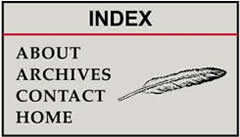
 |
 |

| Wednesday, October 30, 2024 |
Miles from the Mainstream |
D.
R. ZUKERMAN, proprietor |
|
David
McCullough, in his biography, Truman," related that Ambassador
Averell Harriman "… urged Truman to call for a Korean
war resolution from Congress …," but President Truman
took the advice of Secretary of State Dean Acheson "that such
a resolution was unnecessary and unwise." McCullough continued, "The
President, said Acheson, should rest on his constitutional authority
as Commander in Chief." |
|
||||
